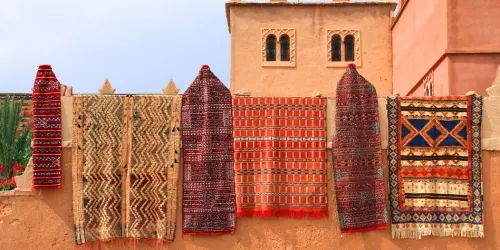No products in the cart.
Rug Knowledge & Heritage
Berber Symbols: Decoding the Patterns and Meanings
If you’ve already explored what is a Berber rug, you know these Moroccan masterpieces are more than décor. In this post, we’ll dive deeper into the Berber symbols—showing you how to recognise their cultural meanings and choose a piece that truly speaks to you.
Why Berber Symbols Matter ?
Berber weavers use geometric motifs to record memories, celebrate life events and ward off evil. Understanding these designs enriches your appreciation and helps you buy authentically.
For a primer on rug origins and materials, read our guide What Is a Berber Rug?.
Berber Symbols and Their Meanings
Before you dive into the individual icons, it helps to remember that Berber symbols form a living alphabet of Amazigh culture. Each sign—whether a simple X or an intricate diamond—acts as a miniature blessing, recording stories of protection, fertility, courage, and everyday life. Use the notes that follow as your key to decoding these timeless motifs.

Amazigh Fibula
A triangular brooch that Amazigh women use for both style and protection—one of the most recognisable Berber symbols of feminine strength.

Animal Skeletons
Stacked triangles that channel ancestral healing power, reminding us that true Berber symbols draw resilience from nature and history.

Barley
A tilted checkerboard praising fertile land and abundant harvests—this Berber symbol calls for prosperity in every household.

Bird
A plus‑sign design that carries baraka—divine blessing and uplifting news—high among classic Berber symbols.

Chessboard
Layered little squares that trap negativity and channel sacred knowledge, proving Berber symbols are both art and amulet.

Eight‑Pointed Star
nterlocked points that signal cosmic harmony and spiritual guidance—an ancient Berber symbol woven into prayer rugs.

Protective Eye
Nested diamonds form an all‑seeing eye, the ultimate Berber symbol for guarding family and warding off the evil gaze.

Finger
A small crossed‑diamond that offers day‑to‑day protection, guiding wearers along life’s path—a humble yet vital Berber symbol.

Fish
Twin lozenges that summon luck and shield against envy; coastal tribes prize this prosperous Berber symbol.

Flower
A diamond with a central cross that blocks the evil eye while welcoming blessings—one of the most beloved Berber symbols.

Yaz (ⵣ)
The Yaz glyph is the boldest of all Berber symbols, proclaiming Amazigh identity and the unbreakable spirit of the “free man.”

Scissors (X)
A simple cross balances opposing forces; this timeless Berber symbol honours justice, mutual respect, and community harmony.

Seed
Hourglass‑shaped and vital, the seed motif blesses a rug with fertility, growth, and prosperous new beginnings—core themes in Berber symbols.

Sickle
A zig‑zag hook paying homage to elders and harvests.

Spider
Interlocked lines create a spider, calling on creative magic and abundant fertility.

Good‑Luck Charm
A rising stair pattern invites luck, progress, and spiritual ascent.

Lion’s Paw
A maze of diamonds forms the lion’s paw, weaving strength, courage, and fierce protection into any textile.

Nose
Mothers stitch this bow‑tie motif to shield children from harm.

Partridge Eyes
Twin checker squares echo a partridge’s gaze, symbolising feminine beauty, grace, and watchfulness among cherished symbols.

Saw
This serrated line honours diligence and craftsmanship, reminding us that patience shapes every masterpiece of Berber Rugs.
Regional Differences in Symbol Use in Symbol Use
Beni Ourain
Neutral diamonds dominate. Motifs are sparse, reflecting the snowy Middle Atlas landscape.
Azilal
Expect vibrant colour blocks and playful symbol mixes—often telling personal stories or daily village life.
Taznakht
Dense, warm‑toned rugs combine diamond chains with complex talisman symbols inspired by desert caravan routes.
Compare styles in our post on Types of Berber Rugs.
How to Read a Berber Rug Like a Story
- Start at the centre: Central motifs often mark the weaver’s core theme (birth, marriage, protection).
- Trace outward: Notice how patterns repeat or evolve—this can signal life chapters.
- Look for colour clues: Natural dyes (madder, saffron, indigo) add extra symbolic layers—red for vitality, yellow for prosperity.
Tips for Buying a Rug With Authentic Symbols
- Ask the seller about the rug’s tribe and motif history.
- Inspect the back: Hand‑knotted irregularities ensure authenticity.
- Choose meaning that resonates: For example, pick a diamond‑rich rug if you’re celebrating a new home or family addition.
Unsure how to verify authenticity? See How to Spot an Authentic Berber Rug.
Final Thoughts: Symbols as a Living Language
Every Berber rug speaks in wool and colour. Decoding its symbols transforms a beautiful object into a personal story you bring home. Next time you unroll a Moroccan rug, let the diamonds, crosses and zig‑zags whisper their centuries‑old tales beneath your feet.

